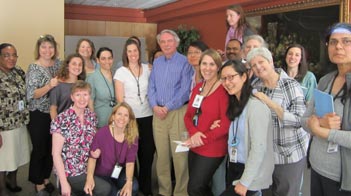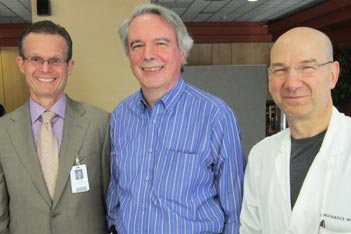Surgeon’s Surgeon Returns to Particle Physics
 Bob Mustard celebrated at St. Michael’s Hospital
Bob Mustard was recognized for his contributions
as a surgeon-educator at Gallie Day. He retired on
June 30th. Bob was born in Toronto, the son of
Robert Mustard senior, the Surgeon-in-Chief at Toronto
General Hospital – “a surgeon’s surgeon who practiced
General Surgery in the interval immediately following
World War II. Physics was my first love. I studied physics
as an undergraduate and in graduate school at Stony
Brook. I particularly loved elementary particle physics,
and worked with the collider, spending one and half
years at Czerny and Geneva. There were many Nobel
laureate level people working on the collider, which was
then the first and hottest, a precedent for the current
hadron collider. I realized I would have to stay in the
United States to continue in particle physics and decided
to go into medicine instead. I applied to the University
of Western Ontario and entered in 1977, in part to get
away from my medical relatives – Frazer Mustard was the
Dean at McMaster and my father was the Chairman of
Surgery at the University of Toronto. I liked London as
a place to live and study. I still have a hobbyist’s interest
in elementary particle physics, which is now very hot,
because of the hadron collider. There won’t be another
one in my view, because they wear out in 10 years, and
the large hadron collider cost over $2 billion to build.
“I will study particle physics and operate part of the
time with friends at North York General. If I continued
at St. Mike’s I would wind up doing more call, more
teaching, and less physics, so when my friend Peter
Stotland suggested that I come there and assist parttime,
it was a great opportunity. No responsibility, no
fighting for beds. I had spent a lifetime helping residents
so I’ll enjoy assisting fully trained surgeons. It is a common
practice to stay on as an assistant after retiring from
clinical surgery and it’s much more interesting and fun
than the retirement activities of some other surgeons
such as medico- legal or workmen’s compensation case
studies. The OR is always fun.
“I go to PEI for about 3 weeks each summer to a
cottage I have shared with friends for the past 25 years.
My wife Ade and I also go to Hong Kong each year,
staying with her sister in that very interesting former
English colony. I have visited the hospitals there with a
gynecologist friend. The hospitals are excellent, very well
organized with feeders to the teaching hospitals. I have
2 daughters. Laura studied philosophy and information
science, and Katherine is finishing in English at the
University of Toronto.”
Bob loves PEI, the beaches, the day trips, the cottage,
and the friends. He reads history, particularly nonfiction.
His most recent book was Anne Applebaum’s
History of Eastern Europe after World War II. Another
was a History of the French Vietnamese War. He also read
William Dalrymple’s History of the British Afghanistan
War - an attempt to keep the Russians out, much like
recent and recurrent versions. He is also a student of
Chinese History.
|
“My approach to teaching medicine and surgery is the
hard science approach- fundamentals and logic rather
than memorization of symptoms to make a diagnosis. I
like to be physically around for teaching (Bob is a loyal
attendant at the Principles of Surgery course, which he
coordinates, making up the POS exam during the lectures,
an activity for which he deserves great credit). I
let the residents progressively do more as I first assist. I
stay with the patient to help, but I push the residents to
‘do it yourself ’. I keep my practice small and underbook
the OR time.
“I have no problem with the work ethic of the young
surgeons, and the subspecialist trend is also OK with me.
Acute care is a good model. It works, the residents like it,
and there are lots of consults.” He mentors residents for
POS exams and takes in-house call at St. Mike’s Hospital
as an acute care surgeon. “Residents are less stressed
when they are not alone at night. They are grateful for
staff level coverage to be available in the hospital. The
emergency room doctors, and OR nurses occasionally
call, - not just the general surgeons. I do general surgery
trauma and Trauma Team Leader (TTL). General
Surgery is sorting into two large groups, the subspecialists
and the acute care surgeons.
 from left to right- John Bohnen, Bob Mustard, and Marcus Burnstein
Q: What are you most proud of?
A: “My practice as a generalist, like my father who was
a surgeon’s surgeon. I like looking after other surgeon’s
problems. I tell them: ‘Send them in’. I get lots of calls. I
go sometimes to their hospital on the weekend to figure
out what we could do with complicated cases. I talk to
the patients and their families, then set the patients up
at the periphery and bring them in for treatment at St.
Mike’s. I’ve been to all these hospitals, including the
academic ones.
Q: What is your advice to surgeons nearing retirement?
A: “My advice to surgeons is to get out before you are
past prime; don’t hang around and get nudged out for
waning competence. Have some other activities to organize
your career planning.
Q: Is there a problem for graduating general surgery
residents in finding jobs?
A: “General Surgeons have no problem with jobs,
though some have had to look for a few months to get
an ideal position. They have no complaints.
Q: Who were your role models?
A: “Bernie Langer with his surgical technique and his
approach to surgical epidemiology and randomized trials.
I went to London to do research with John Duff, a
talented excellent surgeon and McGill researcher. We
studied sepsis, and multi-organ system failure in animal
models, and set up the lab at Wellesley. I shared the lab
with John Bohnen for 10 years, and then got into teaching
My other role models were my father, Bryce Taylor,
Neil Waters, and Al Harrison at Sunnybrook.
M.M.
|